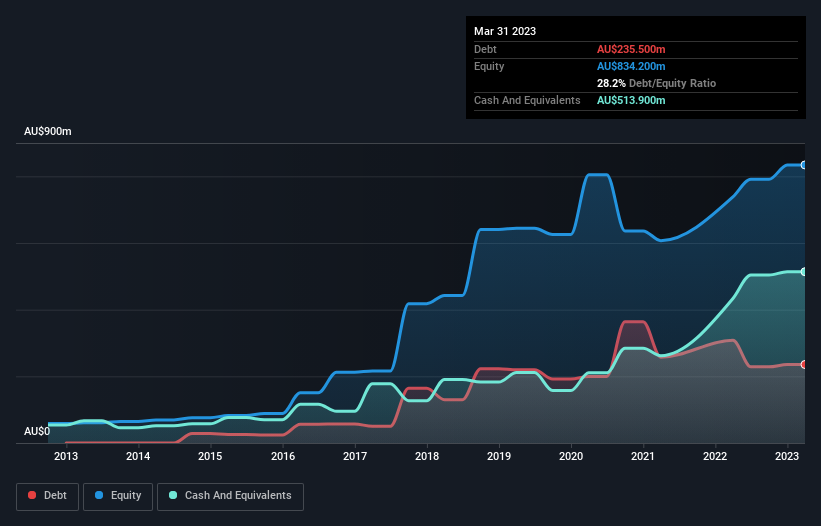Howard Marks put it nicely when he said that, rather than worrying about share price volatility, 'The possibility of permanent loss is the risk I worry about... and every practical investor I know worries about.' So it might be obvious that you need to consider debt, when you think about how risky any given stock is, because too much debt can sink a company. As with many other companies Webjet Limited (ASX:WEB) makes use of debt. But the more important question is: how much risk is that debt creating?
When Is Debt A Problem?
Debt assists a business until the business has trouble paying it off, either with new capital or with free cash flow. Part and parcel of capitalism is the process of 'creative destruction' where failed businesses are mercilessly liquidated by their bankers. However, a more common (but still painful) scenario is that it has to raise new equity capital at a low price, thus permanently diluting shareholders. By replacing dilution, though, debt can be an extremely good tool for businesses that need capital to invest in growth at high rates of return. The first thing to do when considering how much debt a business uses is to look at its cash and debt together.
See our latest analysis for Webjet
How Much Debt Does Webjet Carry?
You can click the graphic below for the historical numbers, but it shows that Webjet had AU$235.5m of debt in March 2023, down from AU$308.2m, one year before. But on the other hand it also has AU$513.9m in cash, leading to a AU$278.4m net cash position.

How Healthy Is Webjet's Balance Sheet?
We can see from the most recent balance sheet that Webjet had liabilities of AU$500.9m falling due within a year, and liabilities of AU$253.1m due beyond that. Offsetting these obligations, it had cash of AU$513.9m as well as receivables valued at AU$174.1m due within 12 months. So its liabilities total AU$66.0m more than the combination of its cash and short-term receivables.
Of course, Webjet has a market capitalization of AU$2.93b, so these liabilities are probably manageable. But there are sufficient liabilities that we would certainly recommend shareholders continue to monitor the balance sheet, going forward. Despite its noteworthy liabilities, Webjet boasts net cash, so it's fair to say it does not have a heavy debt load!
It was also good to see that despite losing money on the EBIT line last year, Webjet turned things around in the last 12 months, delivering and EBIT of AU$61m. When analysing debt levels, the balance sheet is the obvious place to start. But ultimately the future profitability of the business will decide if Webjet can strengthen its balance sheet over time. So if you want to see what the professionals think, you might find this free report on analyst profit forecasts to be interesting.
Finally, a business needs free cash flow to pay off debt; accounting profits just don't cut it. While Webjet has net cash on its balance sheet, it's still worth taking a look at its ability to convert earnings before interest and tax (EBIT) to free cash flow, to help us understand how quickly it is building (or eroding) that cash balance. Happily for any shareholders, Webjet actually produced more free cash flow than EBIT over the last year. That sort of strong cash generation warms our hearts like a puppy in a bumblebee suit.
Summing Up
We could understand if investors are concerned about Webjet's liabilities, but we can be reassured by the fact it has has net cash of AU$278.4m. The cherry on top was that in converted 235% of that EBIT to free cash flow, bringing in AU$142m. So is Webjet's debt a risk? It doesn't seem so to us. When analysing debt levels, the balance sheet is the obvious place to start. However, not all investment risk resides within the balance sheet - far from it. Case in point: We've spotted 1 warning sign for Webjet you should be aware of.
At the end of the day, it's often better to focus on companies that are free from net debt. You can access our special list of such companies (all with a track record of profit growth). It's free.
Valuation is complex, but we're here to simplify it.
Discover if Web Travel Group might be undervalued or overvalued with our detailed analysis, featuring fair value estimates, potential risks, dividends, insider trades, and its financial condition.
Access Free AnalysisHave feedback on this article? Concerned about the content? Get in touch with us directly. Alternatively, email editorial-team (at) simplywallst.com.
This article by Simply Wall St is general in nature. We provide commentary based on historical data and analyst forecasts only using an unbiased methodology and our articles are not intended to be financial advice. It does not constitute a recommendation to buy or sell any stock, and does not take account of your objectives, or your financial situation. We aim to bring you long-term focused analysis driven by fundamental data. Note that our analysis may not factor in the latest price-sensitive company announcements or qualitative material. Simply Wall St has no position in any stocks mentioned.
About ASX:WEB
Web Travel Group
Provides online travel booking services in Australia, the United Arab Emirates, the United Kingdom, and internationally.
Excellent balance sheet with reasonable growth potential.
Similar Companies
Market Insights
Weekly Picks


Crazy Undervalued 42 Baggers Silver Play (Active & Running Mine)


Fiducian: Compliance Clouds or Value Opportunity?

Willamette Valley Vineyards (WVVI): Not-So-Great Value
Recently Updated Narratives

THE KINGDOM OF BROWN GOODS: WHY MGPI IS BEING CRUSHED BY INVENTORY & PRIMED FOR RESURRECTION


The "Molecular Pencil": Why Beam's Technology is Built to Win


ADNOC Gas future shines with a 21.4% revenue surge
Popular Narratives


MicroVision will explode future revenue by 380.37% with a vision towards success


NVDA: Expanding AI Demand Will Drive Major Data Center Investments Through 2026




